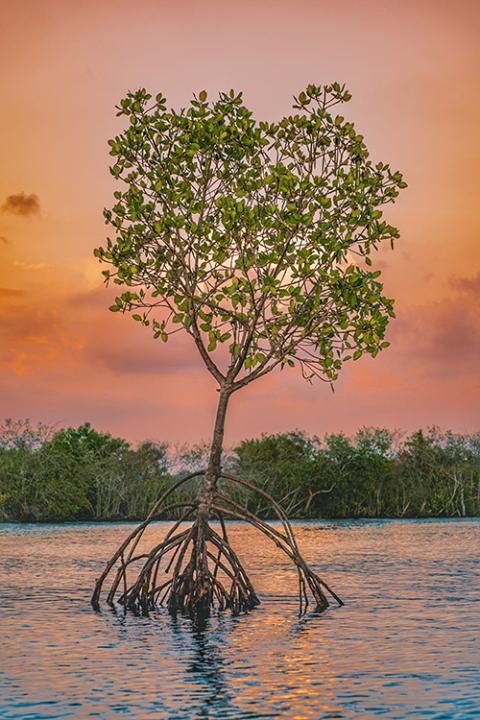
(Unsplash/Lisanto)
In his 2009 book The Sacred Universe: Earth, Spirituality, and Religion in the 21st Century, the late Passionist Fr. Thomas Berry reflected on Christians living in an age of climate catastrophe. Drawing from the rich wells of Scripture and tradition, Berry wrote that, today, "what is needed is a new spiritual, even mystical, communion with Earth, a true aesthetic of Earth, sensitivity to Earth's needs, a valid economy of Earth. We need a way of designating the Earth-human world in its continuity and identity rather than exclusively by its discontinuity and difference. We especially need to recognize the numinous qualities of Earth."
I was thinking of Berry because this Saturday, April 22, commemorates the 53rd Earth Day. Few contemporary figures in the Catholic tradition have so eloquently and directly called for a renewal of not just our thinking and practices around relating to the more-than-human world, but also a renewal in our spiritualities, or ways of relating to the transcendent, to God.
The journey of deepening our spirituality beyond what concerns each of us as individuals or even as a species, toward recognizing a deeper interconnectedness and relationship we already share with the whole of creation, is what Pope John Paul II and Pope Francis, among others, have called "ecological conversion."
I cannot think of a better opportunity to pause and reflect on where each of us is on our journey of ecological conversion than Earth Day.
Ecospirituality invites us to look not to the infinite horizon 'out there' or 'beyond' the spaces and places where we find ourselves. Instead, we are invited to 'relate' to God in and through the created world.
The Earth Day website lists thousands of global events where you can "take action," from tree-planting and environmental cleanup projects to legislative advocacy and community education. While some events are classified under the category of "faith" (many of which are traditional cleanup projects or other initiatives sponsored by faith organizations), only a handful have anything to do with prayer, contemplation, meditation, reflection or worship.
So with this in mind, I am adding one more sort of activity — or better put, practice — to the list: taking some time this Earth Day to focus on ecospirituality.
The term "ecospirituality" is, admittedly, a fairly new descriptor for a concept that is as old as Christianity itself. Rachel Wheeler, a theology professor at the University of Portland in Oregon and a specialist in Christian spirituality, published a helpful book last year titled Ecospirituality: An Introduction. In addition to providing a survey of how ecological spirituality has been part of the Christian tradition dating back to the Bible, through the early desert monastic traditions and the Middle Ages, and into the modern Christian era, Wheeler also provides some helpful framing for what we mean when we talk about ecospirituality.
"Because ecology has to do with one's home — the root meaning of 'eco' — ecological spirituality or ecospirituality describes how one relates to the sacred within the context of our natural, global, and even cosmic ecosystems (or homes) of which we all form a part," she writes.
The use of "eco" from the Greek word oikos should come as no surprise to those familiar with the subtitle of Francis' magisterial 2015 encyclical letter, "Laudato Si', on Care for our Common Home."
One of the helpful clarifications Wheeler offers is that between a spiritual journey of "seeking" versus "relating."
Advertisement
As she explains, "Many spiritual people today would identify themselves as seekers of God, the divine, an ultimate value, something that transcends them, a higher power, or what they would call the sacred. Such quest language tends to characterize the sacred as a goal to be reached and removes the sacred from a person's immediate experience, indicating that the divine or sacred presence has to and can be found elsewhere."
While there is perhaps nothing inherently wrong with the seeking approach to spirituality, she argues that ecospirituality invites us to look not to the infinite horizon "out there" or "beyond" the spaces and places where we find ourselves. Instead, we are invited to "relate" to God in and through the created world — our "common home" — in which we live and are a part.
At some point in each of our lives, we have had an experience of God tied to an encounter with the transcendent within the more-than-human natural world.
Wheeler provides relatable examples: "Many of us have hiked to the top of a mountain or into a forest and felt some sense of presence, an amplification or humbling of our own being, or even just wonder and awe start up within us. This palpable sense of the sacred helps us experience and understand ourselves as integral parts of a whole."
To develop an ecospirituality is to focus on the ways in which God is seen and experienced in the world around us. It is a way of attuning ourselves to the Holy Spirit, the "Lord and Giver of Life," who is still active in the world — both within and beyond the human family — and draws near to us in divine intimacy.
Ecospirituality is also a way of naming our recognition that we are interdependent and interconnected with all of creation. We are not isolated monads, but depend on myriad other creatures for food, oxygen, shelter, fuel and the like.

(Unsplash/Nandhu Kumar)
Ecospirituality challenges us to see how our thoughts and actions contribute to environmental degradation and destruction, which is what Francis rightly calls "ecological sin."
In The Sacred Universe, Berry explains, "We need a spirituality that emerges out of a reality deeper than ourselves, a spirituality that is as deep as the Earth process itself, a spirituality that is born out of the solar system and even out of the heavens beyond the solar system."
To some Christians, the concept of ecospirituality is oddly discomfiting. Such folks often throw around words like "pagan" to describe and attack what they perceive as non-Christian recognition of God's continued action in the world, or at least beyond the human world.
But as the opening lines in the Book of Genesis make clear, God's Spirit draws near to all creation and brings life and order to the cosmos. So much of sacred Scripture echoes this insight, and the Christian community recognizes the pinnacle of this divine intimacy in the Incarnation of the eternal Word.
Perhaps most famously, St. Francis of Assisi articulated the agency of the nonhuman world and God's proximity to all of creation in his "Canticle of the Creatures," which served as a key inspiration for Francis' encyclical.
As the global human community commemorates Earth Day, consider developing an ecospirituality. Spend some time outdoors, reflect on the weather that brings life, water and light; reflect on the plants that take our exhaled poisonous carbon dioxide and provide the breath of life in the form of oxygen; reflect on the trees and stones and soil that ground us and provide the foundations for our shelter; and reflect on the nonhuman animal life, both that which we consume so that we might live and that which exists as co-inhabitants and neighbors in our "common home."
Not only does a renewed ecospirituality help us to see the world more like the way God sees it, as one integrated whole, but it reminds us of our relatively small place within the broader cosmos of God's creative love. Ecospirituality invites us to be more fully human and authentically Christian, welcomed deeper into the awe-inspiring magnificence of God's creation, remembering that we are part of that very same creation.





